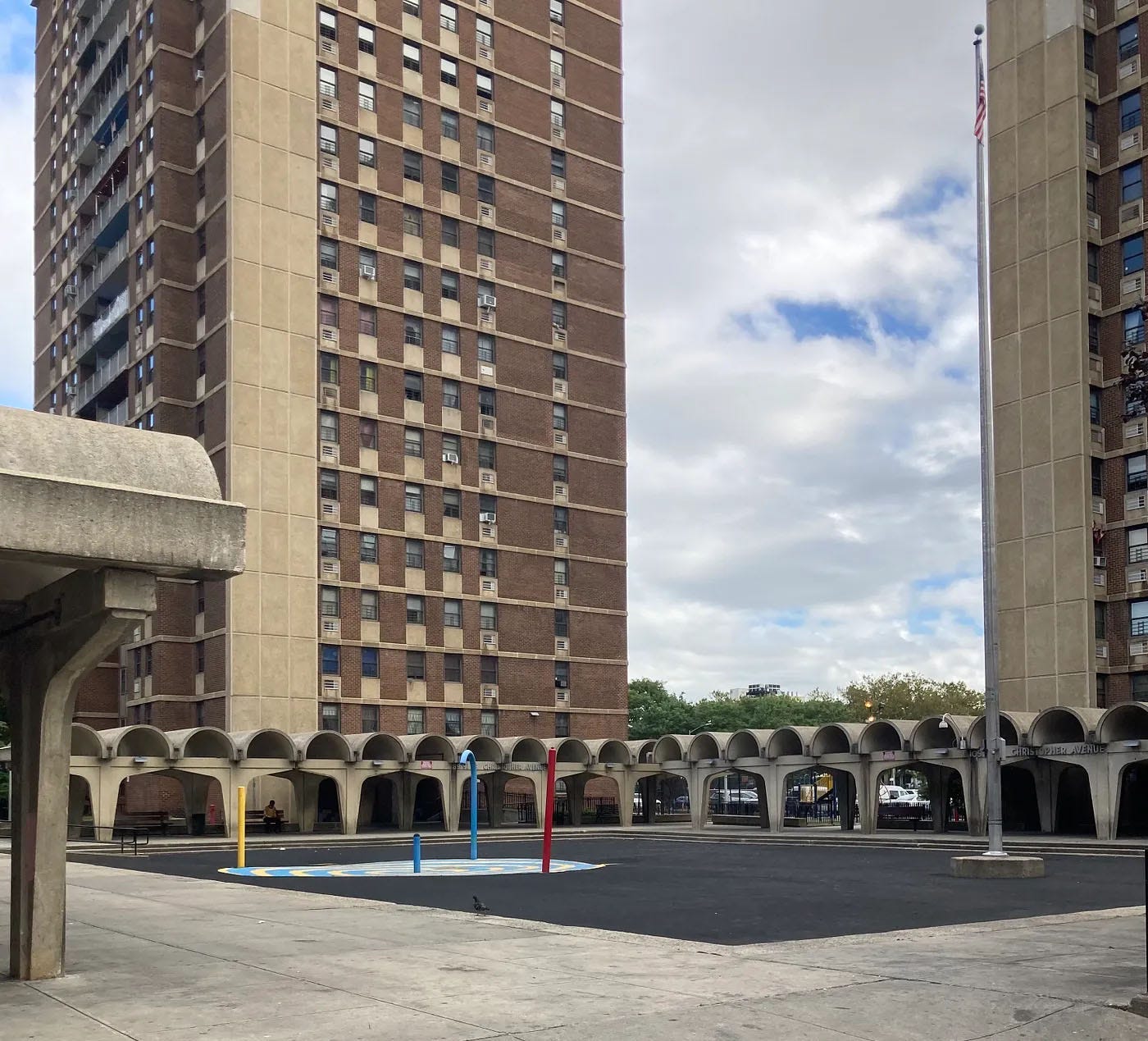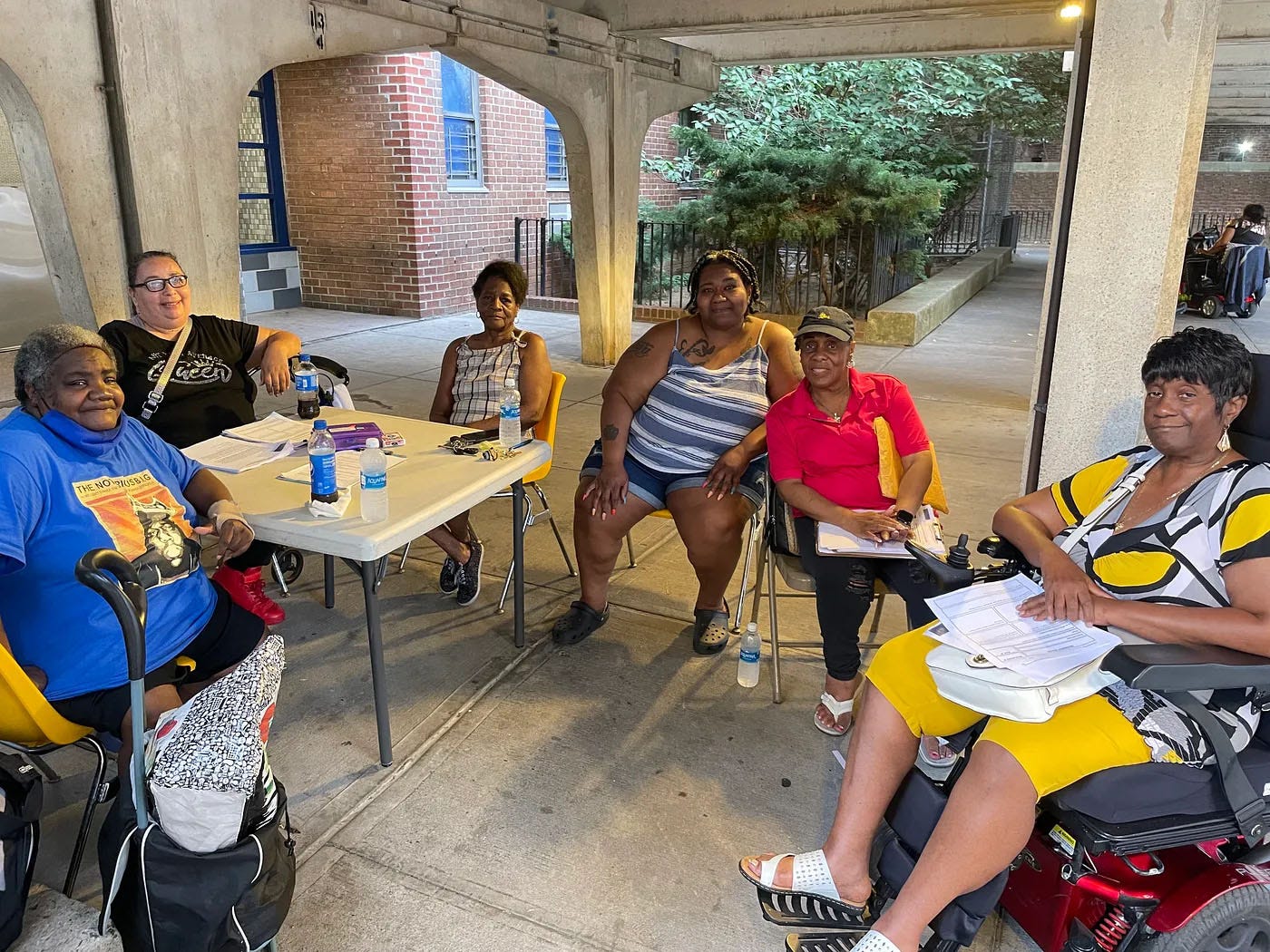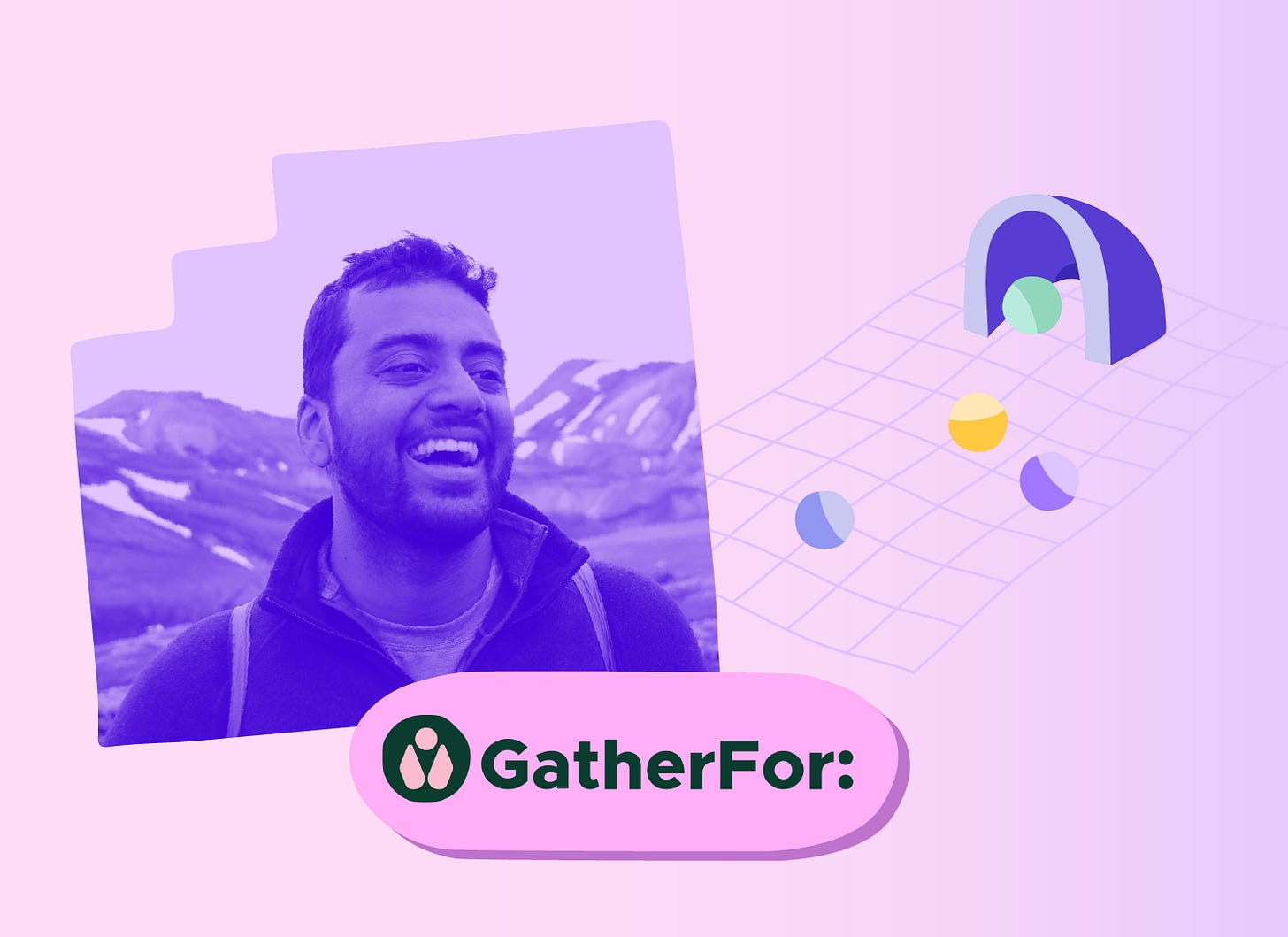🫂💰🛠️ In community, we have everything we need
GatherFor's Teju Ravilochan on what small groups of neighbors working together can accomplish
We’re hiring a Senior Software Engineer for our Public Spaces Incubator! Learn more and apply here.
Join Plurality Institute and The Council for Tech and Social Cohesion for a symposium on comment section R&D at the Internet Archive in San Francisco on May 2.
New_ Public’s interest in community stewardship extends beyond social media, into real life, in-person communities. As Nathan Schneider noted here in the last newsletter, many offline groups are better organized than online communities. And there’s a lot that those of us who want to improve digital spaces can learn from the ways communities come together in person.
Teju Ravilochan, a member of our Community Stewards Guild, builds community bonds through his organization GatherFor, which originates from practicing mutual aid during the pandemic. As you’ll read below, Teju and GatherFor have leveraged in-person stewardship to deliver real, long-overdue wins for people who really need and deserve them. Stewards who want to foster deep relationships, and builders who want to facilitate meaningful impact, will find a lot here.
–Josh, New_ Public Head of Editorial
Teju on GatherFor’s core beliefs and practices:
GatherFor, at the core, believes that in community, we have everything we need. We organize neighbors into teams to support each other and to bring forth the type of neighborhood they want. We then build a self-governance infrastructure in that network of Neighbor Teams, that allows neighbors to lead themselves.
Neighbor Teams are groups of five that meet regularly to support each other. They will watch each other's kids. They will bring each other food. They will visit each other in the hospital. We give those teams $300 a month to convene and gather. They often start financial pooling plans that we match. They put together a $500 pot, which we match to make $1000, which goes to one person in the group. The recipient rotates each month. It's called a susu in Caribbean and West African cultures, though it’s practiced all over the world.
How GatherFor began in Brownsville, Brooklyn, in the pandemic:
I had been volunteering in Brownsville, Brooklyn, where we now work with GatherFor. The people of Brownsville are so interwoven. They're very proud of each other and they really look out for each other. I was really inspired by their collective attitude on one hand. And then on the other hand, Brownsville is a very marginalized, Black and Brown community. Many struggle to get by. The median income is well under the federal poverty line.
And so, when the pandemic hit, I was very concerned about some of the people that I had met. And I thought I could try bringing volunteers together around individuals who have lost jobs, housing and food. We could help them get benefits, get jobs, maybe even get housing. But a lot of folks who we spoke to in Brownsville really resisted the idea. They didn't like the idea of a bunch of privileged, potentially white volunteers coming into Brownsville and helping them out.
So then I proposed this new idea of peers supporting each other in groups, and that had a lot more palatability to folks in Brownsville. We prototyped it a few times with a small organization that I connected with in Brownsville, through the Brownsville Partnership. People said, “Brownsville needs this. This is something we really want to see happen.” Some of them helped put flyers up and spread the word about this new program that we were launching. Through word of mouth, it's grown to about 50 participants now, on ten different Neighbor Teams at the moment.
On bringing GatherFor into a Brownsville housing project:
Brownsville is the largest concentration of public housing in North America. So, perhaps one of the ways to scale to the size of the neighborhood, I thought, would be to build trust with the communities within public housing developments and organize the residents into Neighbor Teams.
The folks living in these public housing developments have gone through a lot. They're survivors of domestic violence. They’re undocumented. They've been incarcerated. They’ve been homeless or lived in shelters.
Public housing developments are managed by the New York City Housing Authority, or NYCHA, which has not managed to make a lot of the repairs that are urgently needed. NYCHA is the largest public housing authority in the United States and oversees some 175,000 apartments in New York. One in 15 New Yorkers live in NYCHA housing, and that’s about 361,000 people. So it's a very large population of people who are experiencing similar conditions.

Introducing GatherFor to the residents of Glenmore Plaza:
I got introduced to Miriam Robertson, the president of the Residents’ Association of Glenmore Plaza, a housing project in Brownsville. She was open to what I had to say about GatherFor. So she invited me to a community meeting at Glenmore Plaza to present the idea of GatherFor. Around thirty people were there, and they spent the first half of the meeting yelling at the NYCHA-employed super of the building about repairs that hadn’t been done in years. One resident’s apartment had a burst pipe that had been causing regular floods for five years. Another resident described how their bathroom hadn’t been working in eight months. One resident, Barbara Cole, who had seizures, described how NYCHA didn’t install a grab bar in her bathroom, despite her repeated requests, for 27 years. And tragically, she fell, hit her head, needed surgery, told NYCHA this story, and still got no response. After residents shared all this and Ms. Miriam asked me to speak about GatherFor, I could tell not a soul cared about what I had to say. They were understandably seething with frustration and anger.
I stopped presenting and asked, “have you ever thought about coming together as a community in order to speak to NYCHA with one voice?” People said “no, we don't really know each other.” And I said, “but you come to these meetings and you’re neighbors.” And they said “yes, but you don’t know what it’s like here. People are passed out in the halls with needles in their arms. Drug deals go down. There are assaults in the elevator. Homeless folks break in to sleep on cold nights and defecate or urinate in the stairwells.” One person I spoke to one-on-one said, “I would never knock on my neighbor’s door. I wouldn't want to start something. It’s better just to keep your head down and try not to look anyone in the eye.” I left that meeting despondent. Here I am with this plucky attitude that if we come together, everything will be fine. But this is serious. People can’t even look each other in the eye. I felt hopeless and like GatherFor would be snuffed out before it really even got started.
Teju takes a new approach, lead by neighbors:
I asked a community organizing mentor of mine, Robbie Block, for advice. He suggested I get 8-12 people together to collect the repair needs of everyone in the building. Around the same time, my friend Jordan Reeves told me the story of a time they overcame the discrimination they faced for being queer trans nonbinary in their Brooklyn neighborhood by throwing a block party, in which they met some of the people who had been harassing them. Jordan told me how it completely changed the neighborhood culture and made them feel safe.
So I went back to a Glenmore Plaza Resident Association meeting and essentially said, we need to get a group of eight people together to go door-to-door and collect the repair needs of everyone in the building. Then we could have a block party, with the press there and everything, and have this be a deadline for NYCHA to complete these repairs. There was a lot of skepticism from the room, but eight people did sign up to help.
They didn’t initially feel safe to go door-knocking, and opted to sit in the lobby at first. When that proved a slow way to meet neighbors and get their repair needs, they came up with going to apartment floors all together in groups of 6-8. They stayed within eyesight of each other at all times and made sure everyone felt safe. In this way, they collected hundreds of repair needs on paper forms. They don't have computers, so I typed up the repair needs in a spreadsheet, and we sent it to the higher-ups at NYCHA.
And we said, here are repairs that are needed at Glenmore Plaza. We are organizing a block party called Kindness Party on August 12th, three months from now, when we hope these repairs will be done. We're going to invite everyone in the community. We’re going to invite the press. We’re going to invite you. And we’d like it to be a celebration of NYCHA completing all of these repairs. What do you say?
NYCHA said yes. They made 1,626 repairs in 60 days, completing 87% of the requested repairs. And they’ve continued to make thousands more repairs since the block party last August.
Glenmore Residents were brought together by the experience. They went from avoiding eye contact, to hugging. People went from not wanting to know their neighbors, to saying, I've got your back, I'm here for you. There's a cultural shift that's happened in the building. It's also elevated the imagination of people in the building. So now there's an exploration of, can residents manage their own building? Can they manage their own repair process? Can they lead this on their own? And it’s paving the way for us to organize residents into Neighbor Teams in the building.
Why listening can be a superpower:
I don’t think we would have figured out how to move NYCHA without inspiration from Robbie and Jordan. And also without listening.
Residents at Glenmore Plaza largely see NYCHA as corrupt, ineffective, and uncaring. And there’s a lot of truth to that. In February, 70 NYCHA employees were arrested for bribery and extortion in the largest Department of Justice action of this kind on a single day, in history.
When I spoke to people at NYCHA, I also learned that many of them grew up in Brownsville and some of them even lived at Glenmore Plaza. They lived with collapsing ceilings and bursting pipes. They know what it’s like to wait years for critical repairs. And now they are working as hard as they can to advocate for their communities inside a beleaguered and besieged bureaucracy.
Some of these folks pointed out to me that NYCHA is always the bad guy, always getting blamed. And sometimes, NYCHA comes through for its residents, but the people who make that happen never get acknowledgement. I think that’s part of why I imagined NYCHA might respond differently to an invitation for a celebration. They had to earn their own win, of course, but they got good press out of this when Channel 12 covered Kindness Party. And if they didn’t do it, there was a chance of getting more bad press, so maybe that was a part of their motivation. It was accountability through celebration.
How to build a pocket of possibility, and expand it:
It's tough figuring out a solution within an imperfect setup or structure. We can't change that whole structure overnight, but we can build a little pocket of possibility and grow it. It was enabled by listening to the residents, finding a few people who were willing to give it a try, listening to the few people at NYCHA who were willing to give it a try, and demonstrating what’s possible. And a story of what’s possible in the hands of folks who are determined to do something, is powerful. Robbie and Jordan, for example, gave our team of eight Glenmore residents that initial inspiration!
Moving forward, we're trying to organize the residents into Neighbor Teams, as we were planning originally. But the Kindness Party also built a lot of trust between GatherFor and the residents of Glenmore Plaza. It's led to the city council member representing Brownsville to say, “hey, that was awesome. Could we do this in other buildings around Brooklyn and New York?” And so it has been a really powerful shift in terms of people seeing what's possible for them.
What happened at Glenmore Plaza really inspired us to think about what small groups of neighbors working together can accomplish in the neighborhood. We saw a hunger for taking action in the community. So we started “action teams,” which are groups of between eight to 15 neighbors that want to make a meaningful difference in their community.
We now have a housing action team, a mental health action team, a child care / youth activities action team, and an entrepreneurship action team. The idea is that these neighbors are going to come together and try to make things better in those areas. The first step here is that each of these action teams is organizing a resource fair in their area to understand the players — the other organizations that do housing or that do entrepreneurship, whose expertise they can draw from. After that, they will have a couple of months and a budget of $5,000 each to materially help at least three people in the community with those issues. So the housing action team may help three unhoused people get housing, for instance.
We don't presume to think that everything will be successful, but we do want to resource everyday people to figure out how they can make their communities better, in the ways that they want to. That's what we're exploring through these action teams as well.

Teju’s challenge for readers:
How, through your existing relationships — be those family, friends, or neighbors — can you think of one need in your life that you could meet through community, and try it? Maybe you and your neighbors trade off cooking for each other on different weeknights, taking off some of the pressure of getting dinner ready every night. Or maybe you organize a block party so folks get to know each other and you have one another’s cell phone numbers. What would it look like to try that? And are you willing to go through some of the logistical and initial resistance you’ll encounter if you do try? If you try anything like this, please reach out and tell me. I believe deeply the change our world needs now isn’t going to come from extraordinary people doing extraordinary things. To paraphrase Mother Teresa, it’s going to come from ordinary people doing ordinary things, with great love.
Thanks Teju!
Taking the bike out for a longer ride this weekend,
–Josh




At a time when most of what we hear and read about leaves us feeling a bit defeated, this story brings hope and the feeling that a bad situation CAN be turned around and people's lives CAN be made better. Thank you ❤️